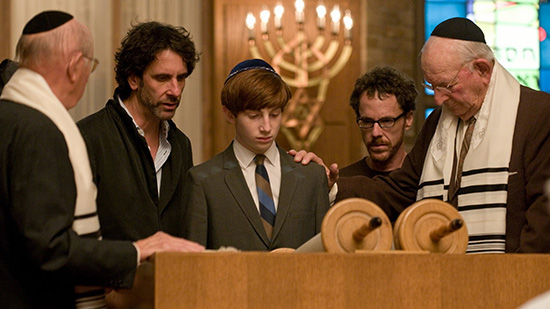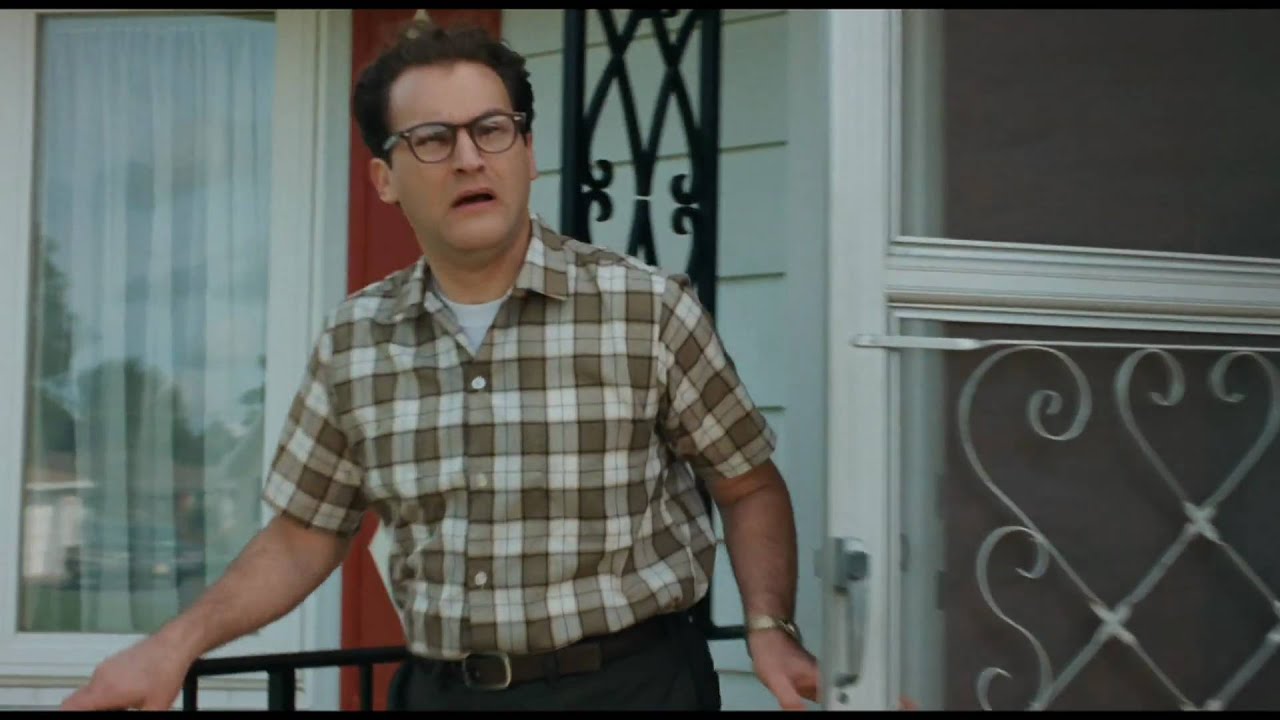On the Blu-Ray version of the Coens’ semi-autobiographical comedy-drama A Serious Man is a featurette titled “Hebrew and Yiddish for Goys”, a montage that defines a number of the sizeable collection of terms not widely known to Gentiles. The most important word in the collection is surely tsuris, a Yiddish noun describing aggravating woes, troubles. This feeling of unease and restlessness is of course felt by members of all cultures, but in tsuris expresses a specifically Jewish interpretation. Why me? What did I do? And in a broader sense, what did we do?
That’s a question all Jews have found themselves asking hashem (God; informal), though most notably the tormented Old Testament prophet Job. It’s also a question asked repeatedly by Larry Gopnik, a Midwest, middle-aged, middle-everything physics professor watching his wife leave him for a family friend. It is also true (as are all but one of those details) of Moses Elkanah Herzog.
In an essay for the October 9, 2000 issue of The New Yorker later re-published as an introduction to a Penguin Modern Classics edition of Saul Bellow’s novel, Philip Roth cited one line of dialogue in Herzog as reaching into the soul of the titular character: “‘I fail to understand!’ – familiar-enough everyday words,” Roth writes, “but for Herzog a humbling, pain-ridden, reverberating admission that dramatically connects the intimate wickerwork of his mental existence to the tormenting grid of error and disappointment that is his personal life.”
That description could be the logline for A Serious Man, which stars Michael Stuhlbarg as Gopnik, in the role of a jaded father weathering a mid-life crisis and tense office politics in the suburban Midwest of the 1960s – an already-troublesome setting for a family with a shtetl surname. A Serious Man isn’t exactly Fiddler on the Roof, but it is the ever-present spectre of antisemitism that feeds Gopnik’s ever-present anxiety, be that from his “very much” goyische hyper-masculine neighbour, or from something imagined altogether.
Alongside that fixation with the coming persecution on the doorstep, Gopnik is in a number of ways the archetypical Jewish character – a man with little to carry on his back aside from the weight of the world. By choosing to depict antisemitism via the modest family man’s paranoia about mistreatment, instead of actual cases of anti-Jew hatred, the Coens confirm that their gaze is firmly focused on the neuroses encompassing Jewish diaspora existence rather than the reason the Gopniks are diaspora Jews in the first place.
A Serious Man is certainly the Coens’ most overtly Jewish film, and has often also been called their most religious, the latter of which is likely intended as a compliment but isn’t a particularly accurate one. Divinity is neither the theme, the setting nor the subject of A Serious Man. God, insofar as He is a presence at all, is more of a character, a constant overseer who serves to symbolise the inherently uncontrollable nature of existence; the force which allows Larry to crash his car mildly just when his arch-rival Sy Abelman is killed in his; which gives the lawyer who has all the answers a heart attack just when he’s about to disclose them; which has a final, possibly fatal, twist in the tale for Larry.

The Coens’ film is therefore eminently concerned with the way we relate to the divine, more than the very nature of it. A Serious Man is treading the same above-all-sceptical approach toward formalised systems and institutions that the Coens have always leaned on, be that the inept intelligence community of Burn After Reading or the rancid politics of Depression-era Mississippi in O Brother, Where Art Thou?. As much as Sy Abelman or the supernatural terror enacted by hashem, a dogmatic loyalty to antiquated, doctrinaire cultural practices are the antagonist of Larry Gopnik.
A Serious Man is the Coens’ most personal film, then, in the sense that their attention lies closest to home and their youth. But the acute and occasionally poignant act of looking deeper at the amateur apparatuses cloaked in worldliness, which defines their filmography, is eminently present – and deployed to great effect. The three rabbis, each more abstract and disappointing than the last, embody this. There is no epic poem, nor a moralistic Western crime novel to provide the philosophical foundation for A Serious Man; the primary source material here is the Jewish tendency to mock figures of supposed religious authority – a custom as old as the ancient religion itself – and a dash of the Coens’ own lives.
That’s not to say A Serious Man is short on Big Ideas – far from it. Similarities to the parable of the Old Testament prophet Job have been well-documented, as have working physicists and rabbis’ attempts to grapple with what the Coens are trying to express about Schrödinger’s paradox, which appears in a number of forms, subtle and otherwise.
What has been talked about less is Stuhlbarg’s Gopnik, a character with more agency than he has been credited with. Like Moses Herzog, the central character of A Serious Man is the subject of his story as much as the sufferer of it. What Larry Gopnik decides (or fails to decide) frequently has grave consequences on himself and his loved ones, often ironically. It is no coincidence, for example, that it is the very moment he decides to forge Clive’s grade that Gopnik receives his fateful phone call. Similarly, it is the professor’s chronic inability to challenge his brother’s troublesome lethargy that drives deeper the wedge in his already-flawed marriage.
The popular understanding of A Serious Man as the tale of a simple man beset by supernatural inequities doesn’t quite do justice to the weaknesses and complexities of one Larry Gopnik. In contrast to the acquiescent, virtuous Job, Gopnik is a short-tempered, avoidant father who accepts life as a push-over until he is pushed over the edge. Less Job, more Larry David.
The obvious difference between Herzog and Gopnik are their fields of study: Herzog is an English scholar whereas Gopnik teaches physics, a useful setting for the Coens to field their cosmic ruminations. Gopnik is at first thrilled to teach Schrödinger’s paradox, the famous thought experiment which attempts to illustrate that observation can influence outcome. But later, as events proceed in anyone’s favour but his, Gopnik forces himself to explain Heisenberg’s uncertainty principle, concluding, “We can’t ever really know what’s going on. [But] even though you can’t figure anything out,” he tells his students coldly, “you will be responsible for it on the midterm.” He also addresses himself – and much of humanity. Now you understand the tsuris.
It calls to mind the disenchantment Moses Herzog feels on his way home from a jovial social gathering, a founding passage in the subculture of Talmudic disillusionment:
“Herzog considered what matters were like: I fall upon the thorns of life, I bleed. And then? I fall upon the thorns of life, I bleed. And what next? I get laid, I take a short holiday, but very soon after I fall upon those same thorns…
“What good, what lasting good is there in me? Is there nothing else between birth and death but what I can get out of this perversity – only a favourable balance of disorderly emotions? No freedom? Only impulses?”



